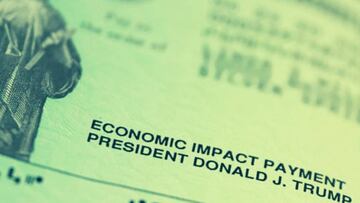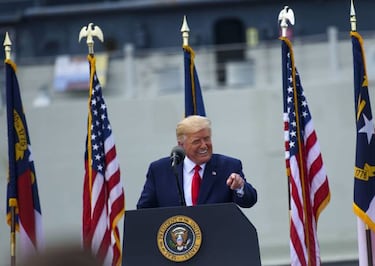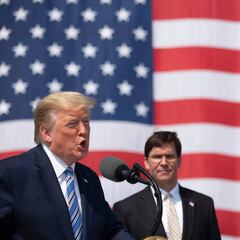Stimulus checks: what has been agreed and what remains to be resolved for a second payment?
While Republicans and Democrats remain some way off a complete deal on a coronavirus relief package, we have seen some progress made of late.

After weeks of negotiations, Republican and Democratic lawmakers left for summer recess in early August without having come any closer to an agreement on a coronavirus relief package, which, among other measures, could include a second round of stimulus checks, if or when it is eventually passed.
The first round of $1,200 stimulus checks began rolling out in April as part of the $3 trillion CARES Act that was approved in March, which also included a $600 weekly federal unemployment boost for out-of-work Americans on top of their regular state benefits. But with those benefits having now dried up (the $600 unemployment benefit expired in early July), struggling Americans are eagerly hoping Congress will pass a new bill that includes a new round of stimulus checks and extended unemployment aid.
- Schumer says good chance coronavirus aid bill will pass
- Democrats give latest Republican offer short shrift
- Senate to vote on a GOP proposal for coronavirus relief on Thursday
- Second stimulus check: 8 and 14 September key relief-bill dates
- Trump knew Covid-19 "deadly" but played it down, interviews reveal
- Trump called Blacks and Hispanics "too stupid" - Cohen
Stimulus Checks: second payment position changing
While Republicans and Democrats appear to be some way off a deal, there had seemed to be significant progress made of late. (Although, one thing both sides have agreed on from the start is the need for both a second round of stimulus payments and the extended federal unemployment boost. However, the figure for the latter is more likely to be in the region of $300-$400 the second time round).
Democrats had originally come to the table with the HEROES Act, which would see $3.4 trillion of federal spending to fund state and local governments and offer a helping hand to small business and individuals. Meanwhile, the Republicans proposal was a much more modest $1 trillion spend in their so-called HEALS Act.
The major cause of the impasse between both sides was their unwillingness to budge on these figures. However, in the past few weeks, both parties have moved closer towards an agreement by re-jigging their budget proposals.
Having agreed to come down to $2.4 trillion in August, Democratic House Speaker Nancy Pelosi dropped a further $200 billion to $2.2 trillion following a phone conversation with Republican negotiator, White House Chief of Staff Mark Meadows.

“We have said again and again that we are willing to come down [and] meet them in the middle,” Speaker Pelosi said to reporters. “That would be $2.2 trillion. When they’re ready to do that, we’ll be ready to discuss and negotiate. I did not get that impression on that call.”
Meanwhile, Meadows said that the Republican offer could be raised by $300 billion, revealing that President Donald Trump was willing to sign a $1.3 trillion package into law (a package, it must be noted, that would not include a provision for a second round of stimulus payments). However, Pelosi has maintained that this figure is still too low.
Coronavirus relief package: both sides have come $500bn closer
While the impasse continues, both sides have now at least come $500 billion closer to a mutual figure. However another issue is how both parties have approached negotiations, which is something that needs to be resolved – as highlighted by Forbes senior contributor and personal finance expert, Rob Berger.
“Republicans want to evaluate and negotiate each major piece of the stimulus package. This was evident in past negotiations where Republican negotiators made offers on specific pieces of the legislation, such as unemployment benefits and state and local government funding,” writes Berger.
“In contrast, Democrats want to focus on the top line number. They want to reach agreement on the total cost of the package and then fill in the details later. This was evident in their offer to compromise on the overall cost of the next stimulus package.”
As such, it will be vital for both sides to resolve their different approaches to negotiations. “If they can get past this hurdle, there's one element of the stimulus bill that could go a long way to helping the parties reach a final agreement—aid to state and local governments,” adds Berger.
Coronavirus relief package: bridging the $900 billion gap
As it stands then, there is still a $900 billion gap between Meadows and Pelosi’s latest proposals ($1.3 trillion and $2.2 trillion, respectively). And one way to bridge that gap, as suggested by Berger, would be to focus specifically on their respective proposals for state and local government funding – here, Democrats want to spend $915 billion, while Republicans have a proposed just $150 billion.
“Simply put, state and local governments don't need $915 billion, or anything close to that figure. Moody's Analytics puts the budget shortfall at $500 billion. And that's not what state and local governments need now, it's their budget shortfall over the next two years,” he writes.

“Even if the federal government covered this entire shortfall, it would close the gap by over $400 billion. An agreement to cover just the next year's state and local government budget shortfall would narrow the gap even further. Such a deal would require both sides to compromise.”
What about stimulus checks?
Even if Republicans and Democrats eventually agreed not to include stimulus checks in a new bill, Americans could still receive a stimulus check distributed by their state or local governments.
Related stories
In theory, local stimulus checks could be funded through the aid administered to state or local governments as part of the new bill. Of course the chances of that theory becoming practice would depend on the amount of funding state and local governments receive under that bill. And the policy on locally-distributed stimulus checks could vary from state to state.
Though, it be must be noted that several local governments did indeed administer one-off cash payments to residents, which were paid for through the Coronavirus Relief Fund that was approved in the previous CARES Act. So such a scenario could happen again under a new bill.

